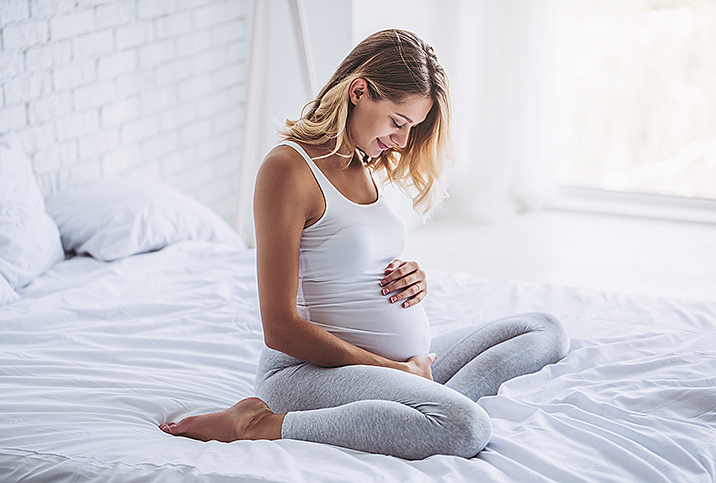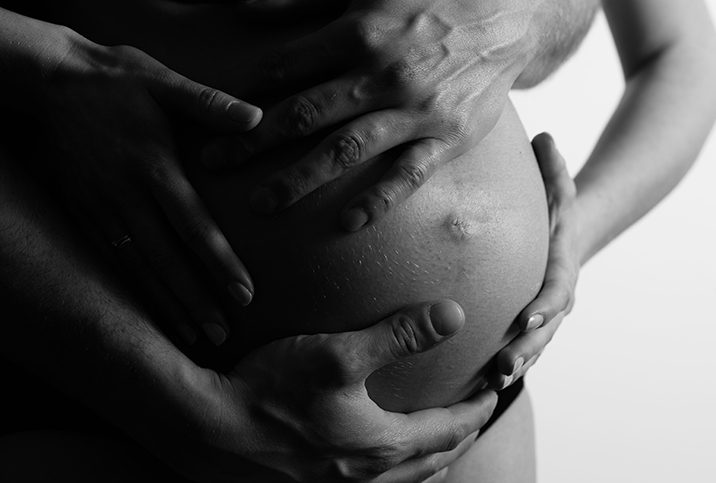Pregnancy and Sex: Answers to Your Pressing Questions

Sex during pregnancy has long been a topic of conversation, a subject of myths and misconceptions. While it’s an individual decision, many of the questions women ask are similar, and we have answers.
Q. Can I have sex during pregnancy?
A. Yes, you can have sex! Oral, vaginal, anal, you name it. They’re all fair game. Unless your doctor has told you otherwise, it is perfectly safe to have vaginal intercourse while pregnant. During vaginal intercourse, the penis does not penetrate beyond the cervix, so the baby won’t feel a thing.
Q. When should I stop having sex?
A. If you are carrying twins, have gone into early labor previously or have placenta previa (your placenta partly or completely covers your cervical opening), you may want to avoid sexual intercourse altogether.
Q. What sex positions work best?
A. Though it’s possible to have sex, sometimes it’s not all that easy or comfortable. If you find sex during pregnancy difficult, try positions like mama on top, doggy style or lazy spoons. These positions keep pressure off the belly while giving the mother better control over the range of motion.
Q. Will I still get turned on?
A. Yes, though you may find that you’re not getting aroused in the same way as before. Pregnancy hormones have a reputation for changing women’s sexual appetites. Some may feel an insatiable physical desire for their partner; others might want to just cuddle.
Being pregnant can definitely change the way you experience intimacy with your partner. For example, you might have hated foot rubs before, but now that’s all you want. Some women say they enjoy anal sex more while pregnant, because the increased blood flow to that area heightens the sensation. There’s no cookie cutter answer to this question, because it will change depending on who you ask. Everybody’s libido is different.
Q. Can sex during pregnancy cause miscarriages?
A. There is no evidence that sexual intercourse can cause miscarriages. It’s a total myth. Miscarriages are the body’s natural response to risky pregnancies and occur when a developmental abnormality is present in the fetus.
Statistically speaking, most miscarriages occur within the first 13 weeks of pregnancy, with very few in the second and third trimesters. Even so, moms-to-be with normal pregnancies can still engage in sexual intercourse during their first trimester without risking miscarriage.
Q. Can I use lube? Condoms?
A. Yes, it is safe to use lubricant and condoms. Sure, you’re already pregnant, but condoms will protect you and the baby if your partner has STIs, or if you plan to engage in casual intercourse with other partners. If you opt for tried-and-true latex condoms, be sure to use a water-based lubricant. Silicone-based lubes are long-lasting, but they can deteriorate latex and lower the overall effectiveness of the condom.
Q. Will my vagina stretch after birth?
A. There’s no diplomatic way to avoid the obvious answer: Yes, you will lose some strength in your pelvic floor after giving birth. However, although the skin in your vagina was physically stretched out, it’s not beyond repair. Your body was designed for this. You’ll be able to enjoy sex again after a relatively short recovery period, usually up to six weeks after delivery.
You can get your vagina back into fighting shape faster with Kegels, exercises that specifically target your pelvic floor. As an added bonus, Kegels help with bladder control.
Q. How can I be sure of all of this?
A. When in doubt, talk to your doctor. Sex during a normal pregnancy is safe. That being said, this is an extremely personal decision. It’s really up to you if you want to have sexual intercourse when you’re expecting.
If you’re still unsure about having sex, or if you feel pain during intercourse, speak with your doctor. This guide has some basic information for moms-to-be, but it’s no substitute for professional medical advice from your healthcare provider.

















